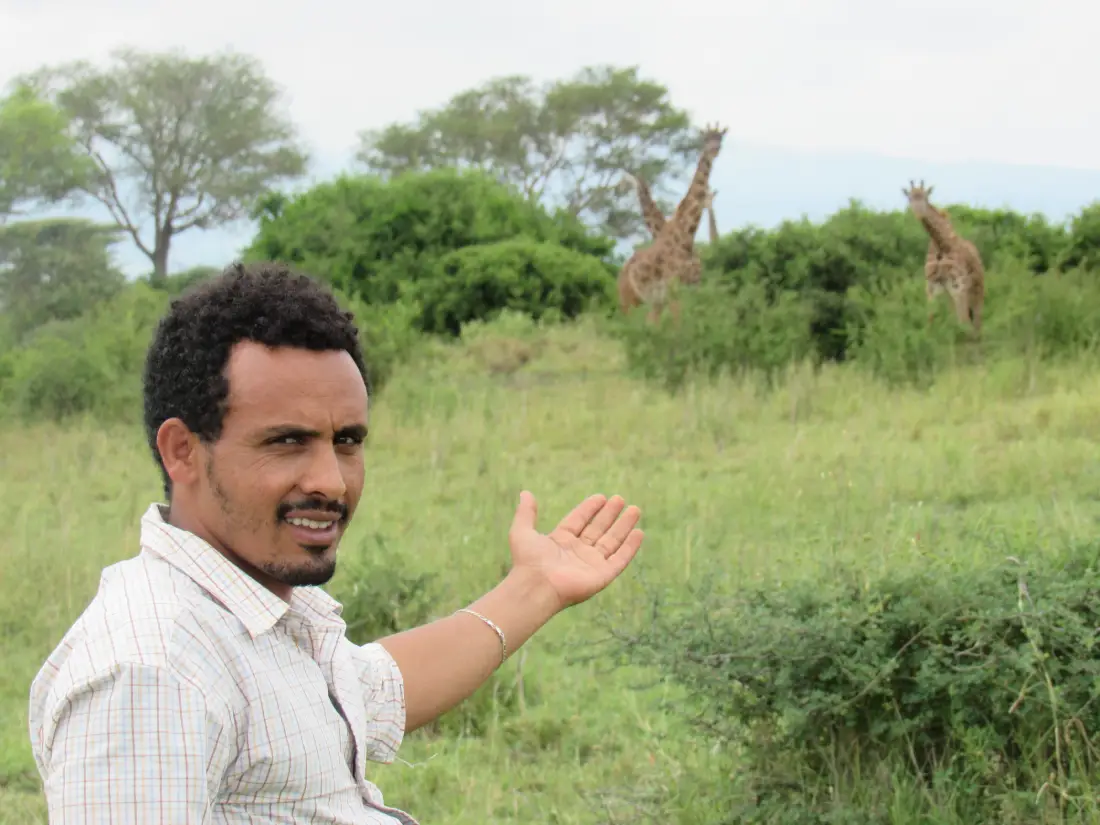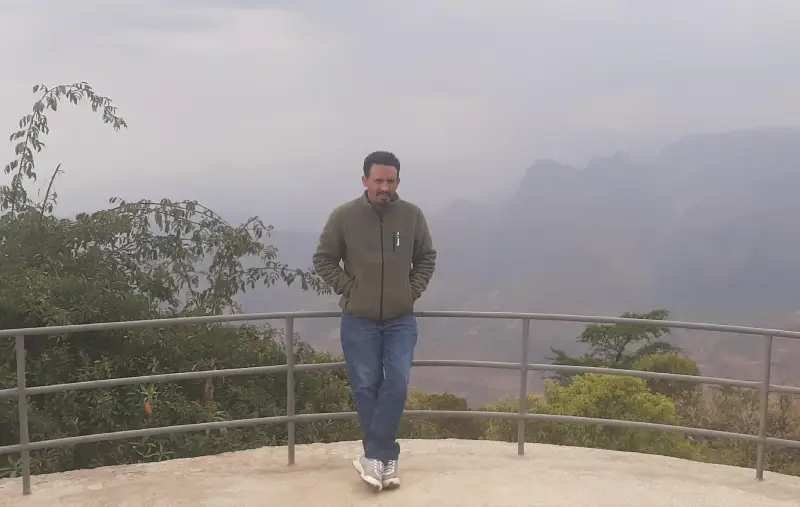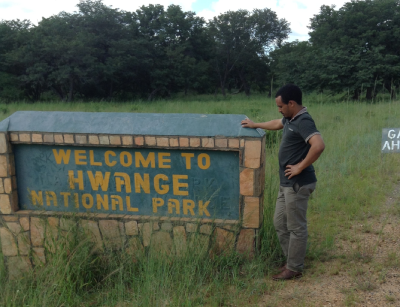From Herdboy to Ecologist: Tibebu’s Unexpected Path to Ecological Discovery in Ethiopia

Tibebu Yelemfrhat Simegn at Manyara Ranch in Tanzania.
Growing up in the Amhara Region, North Shewa Zone, about 180 kilometers north of Addis Ababa, Ethiopia’s capital, Tibebu Yelemfrhat Simegn spent his childhood tending to his family’s livestock. As a young shepherd, he was responsible for protecting the family’s sheep from predators such as jackals.
"My family was engaged in farming, growing, and cultivating teff, an annual bunch grass native to Ethiopia used to make enjera, a sour fermented flatbread," Tibebu explained. "We also grew wheat, sorghum, vegetables, and lowland fruits like oranges and mangoes. Livestock, especially cattle and sheep, was another significant part of our livelihood."
Tibebu recalls how his childhood friends often lost sheep to jackals. However, his experience was different. "I took my duties very seriously and was good at protecting my sheep," he shared. "I remember chasing off jackals whenever they came near my flock."
Today, Tibebu stands at the forefront of conservation efforts in Ethiopia, working to protect endangered species such as the Ethiopian wolf, promoting the peaceful coexistence of people and wildlife, and advocating for sustainable conservation practices. As a Landscape Manager for the African Wildlife Foundation (AWF) in the Simien Mountain Landscape, Debark, he oversees conservation efforts in priority areas, including the Simien Mountains National Park (SMNP).
According to the International Union for Conservation of Nature (IUCN) Red List of Threatened Species, fewer than 500 Ethiopian wolves remain in the wild. Their survival is increasingly threatened by habitat loss due to agricultural expansion, overgrazing, and human encroachment.
Rising Through the Ranks

Tibebu Yelemfrhat Simegn at Simien Mountains in Ethiopia.
Tibebu’s interest in conservation deepened when he enrolled in a bachelor's degree program in applied biology, where he explored life sciences and biodiversity, including conservation. After earning his bachelor's degree in 2008, he secured a position with the Ethiopia Wildlife Conservation Authority (EWCA) as an ecologist at Awash National Park (ANP) in eastern Ethiopia.
"Working at ANP gave me hands-on experience in biodiversity conservation and allowed me to learn from senior staff and researchers," Tibebu said.
Within two and a half years, he was promoted to delegate warden at ANP and later became a permanent warden at Nechisar National Park (NNP) in southern Ethiopia. These roles helped him refine his skills in protected area management, stakeholder engagement, and conservation planning.
In 2013, Tibebu pursued a master’s degree at Addis Ababa University, where he researched the carbon stock potential of the Simien Mountains National Park. His findings underscored the park’s critical role in climate change mitigation.
"My research findings on the estimation of carbon stock potential in the Simien Mountains National Park's lowland forest highlighted the need for effective conservation strategies to protect this vital ecosystem and its role in combating climate change," he explained.
After earning his master’s degree, Tibebu was appointed National Parks and Wildlife Sanctuary Regional Coordinator at EWCA Headquarters from 2014 to 2015.
Joining AWF and Expanding Horizons
Tibebu joined AWF’s Conservation Leadership and Management Program (CLMP), a two-year on-the-job training initiative aimed at developing young African leaders in conservation.

Tibebu Yelemfrhat Simegn during his time in Hwange National Park in Zimbabwe.
As part of the program, Tibebu gained international experience in Southern Africa, particularly in Zimbabwe, where he supported AWF’s subgrant for black rhino conservation at Save Valley Conservancy and the wild dog conservation fund at Hwange National Park.
Additionally, he contributed to conservation efforts at Inguzi Conservancy, focusing on maintaining a stable antelope population. He also spent nine months at Manyara Ranch in Tanzania, where he supported ecological and law enforcement practices within and around the ranch.
"It was an incredible opportunity to gain insights into modern management approaches, donor-based project management, strategy development and implementation, government relations and advocacy, capacity gap analysis for key stakeholders, stakeholder engagement, and brand management," Tibebu said.
Transforming Conservation in Ethiopia
As an ecologist for AWF, Tibebu has spearheaded transformative initiatives in the Simien Mountains National Park (SMNP), including the introduction of a technology-based ecological monitoring system that replaced traditional methods. This shift, implemented over one and a half years, significantly improved wildlife monitoring and data collection.
"My team and I worked hard to implement a more effective wildlife monitoring system within SMNP," Tibebu shared. "Today, the park is among the best in Ethiopia for ecological monitoring and data collection."
By the end of 2021, Tibebu was promoted to AWF Deputy Program Manager for the Simien Mountains. In this role, he supported experts, SMNP management, EWCA, and other partners to enhance holistic wildlife management and promote sustainable conservation practices.
In November 2022, Tibebu advanced to Landscape Manager, where he collaborates with the landscape director to strengthen government and partner relationships, support the technical team, and represent AWF in civil society-related planning and reporting.
Over the years, Tibebu has achieved significant milestones. These include securing the current KfW funding for AWF, introducing a new wildlife monitoring system for SMNP management, and establishing a federal-regional government collaboration platform for conservation, as well as soil and water management across the landscape.
"Together with the team, we developed a 10-year management plan for SMNP, supported the creation of a fire management strategy, and designed an implementation approach for grazing pressure management," he added.
Tibebu also takes pride in having fostered improved collaboration between AWF and EWCA, ensuring better integration of conservation efforts across Ethiopia.
Despite his achievements, he remains humble and focused on inspiring the next generation of conservationists. "It is important they seek proper skills in conservation. In addition, passion, commitment, and collaboration are key in the conservation space."
Reflecting on his journey, the father of two chuckles at his family’s perspective on his work. "They still joke, ‘after all those years of schooling, you work to protect jackals and baboons?’"
From herding sheep in the Ethiopian highlands to leading conservation efforts nationwide, Tibebu’s story exemplifies how early experiences can inspire a lifelong commitment to fostering coexistence between people and wildlife.